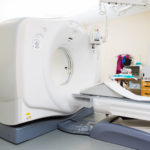[su_box title=”Keep in mind…” style”=”default”]
- Coverage of CAT scans will depend on your individual policy
- Financial assistance for medical care is available for those who qualify
- CAT scans can cost between $300 to $1000 or more
[/su_box]
Whether your health insurance covers the cost of a CAT scan depends on your individual policy. Some policies are more comprehensive than others, covering a wide range of medical tests while other plans may only cover a limited number of services.
Protect yourself by shopping for low-cost health insurance quotes now!
What is a CAT scan?
A CAT scan, also known as a CT scan, is a non-invasive procedure, which combines standard x-ray with modern computer technology.
During such a scan, the patient lies on a bed, which is then moved into a large, tube-like CAT scan machine.
As the x-ray moves along the length of the tube, it rotates to take 360° images of the patient. This type of scanning allows the machine to create image “slices” of the entire area being studied by doctors.
How do I know if my health insurance covers a CAT scan?
In most cases, a standard health insurance plan will cover the cost of a CAT scan if your primary care physician or emergency room doctor believes it’s medically necessary.
Keep in mind that your co-pay will depend on the purpose of the scan and where it’s performed.
For example, one that’s ordered by an emergency room doctor because of a life-threatening condition will most likely be more expensive, and the co-pay will be higher.
Also, keep in mind that there are two major types of CAT scans, a full body scan, and a diagnostic scan.
Both scans may involve one or more body parts, but the latter is more specific because doctors are looking for signs of a specific disease or illness.
Diagnostic scans typically cost quite a bit more than standard, full body scans. Your co-pay may be different in relation to both types of scans and why they are necessary.
Your health insurance documents should explain any differences and how they apply to you.
It’s not uncommon for us to feel as though we’re being forced into making diagnostic decisions while visiting the doctor’s office.
However, rest assured that you always have time to think about a decision unless you are facing a life-threatening circumstance.
If your doctor recommends a CT scan and you’re not exactly sure, you can always take a day or two to think about it. This is also a great way to buy a little time so that you can read your policy documents and find out what’s covered.
If you don’t have the luxury of taking a few days to choose, you can always insist that the doctor’s office contact your health insurance company and find out whether the procedure will be covered.
Every now and again, you may have encountered a doctor’s office unwilling to do this for you, but more often than not, they either will know the answer already or will call the insurance company on your behalf.
Just be careful not to do what you are told simply because you feel like you’re being pressured.
What do I do if my health insurance doesn’t cover the cost of a CT scan?
If your health insurance does not cover the cost of a CAT scan, you will be left to pay for it on your own, should you elect to undergo the procedure. The less costly scans usually can be had for between $300 and $700.
Diagnostic scans can be twice that amount depending on what’s scanned and the purpose behind having the procedure done.
You will be expected to render payment at the time of service unless you have made other arrangements previously.
Fortunately, the vast majority of CAT scans are done at hospitals or large clinics. Because of this, most are willing to work out monthly payment plans for individuals who cannot afford to pay for their test up front.
You’ll probably be asked to make a deposit at the time of service, then you’ll be billed for the remaining balance. If your financial situation requires a monthly payment plan, be sure to be upfront and honest about what you can afford.
One final option is to apply for financial assistance from the institution where you have the test performed. It’s not uncommon for hospitals to offer such programs based on income and need.
If you qualify for financial assistance, you may be eligible to receive significant discounts for all your care at that facility.
Discounts can range anywhere from 20 percent to 75 percent off. Keep in mind that not every hospital offers a financial assistance program.
Can I use both my health insurance and financial assistance?

You can still ask to set up a payment plan with the provider if you can’t afford the balance up front.
You do need to understand that financial assistance is designed for those who have no insurance and cannot afford their medical care in any other way.
It is not intended to provide free money to individuals who already have insurance.
Unfortunately, the cost of medical care in the United States is increasing faster than anything else in our economy. If you need tests like CT scans, they will be costly to someone, whether that’s you or your health insurance company.
Hopefully, your insurance plan will cover most of the cost should you ever need one of these tests. If not, you’ll have to choose whether a CT scan is worth paying for on your own.
Enter your zip code below and compare affordable health insurance quotes in your area!
[su_spoiler title=”References:” icon=”caret-square” style=”fancy” open=”yes”]
- http://www.emedicinehealth.com/ct_scan/article_em.htm
- https://medlineplus.gov/ency/article/001927.htm
- http://www.health.com/health/gallery/0,,20867990,00.html
- https://medlineplus.gov/financialassistance.html
- https://en.wikipedia.org/wiki/Affordable_Health_Care_for_America_Act
[/su_spoiler]




